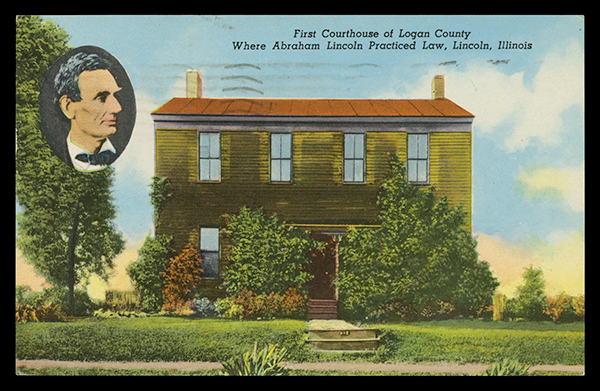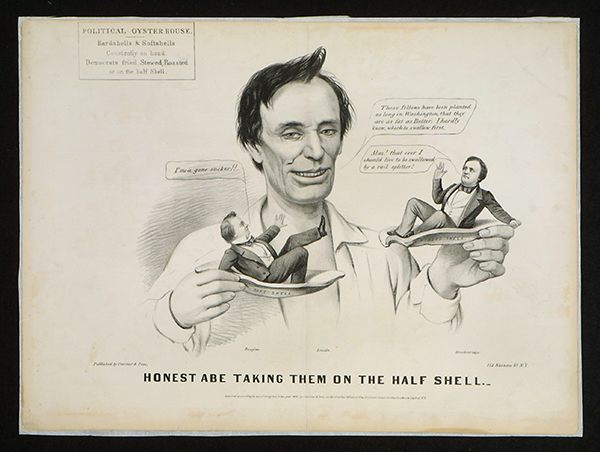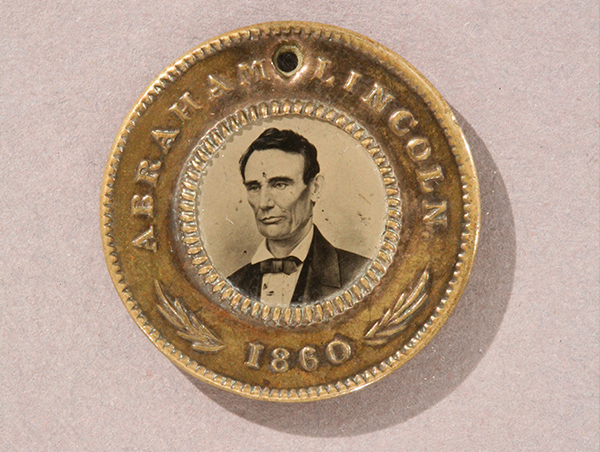What If Abraham Lincoln Hadn’t Been a Traveling Circuit Lawyer? – Stories of Innovation – The Henry Ford

Abraham Lincoln woke up that bright Spring morning with a smile on his face and a sense of anticipation. He quickly got ready for the day, then checked what he had packed the night before: some changes of clothes, a large leather portfolio filled with legal papers, a few favored books, and a folding shaving mirror because he felt that being clean-shaven set a good impression. He donned his tall, felt stovepipe hat, wrapped a shawl around his shoulders to keep out the morning chill, saddled up his horse Old Bob, and was off for an eagerly awaited three-month journey on the Judicial Circuit.
Every Spring and Fall, Lincoln traveled with a judge and a group of lawyers like himself to the small towns and villages of the Eighth Judicial Circuit. He loved the life of a traveling circuit lawyer. He could put his legal expertise to use, hone his skills of quick thinking and persuasion, catch up with old friends, and enjoy some much-needed solitude. He didn’t know it yet but this experience would prepare him to later serve as President of the United States.
Passion for the Law
As a young man, Lincoln was intrigued by the law. He liked the idea of living by his wits, being respected by the local community, and rising up in the world. He hung around frontier courthouses, watching lawyers examine witnesses and deliver impassioned speeches. He also sat on juries, occasionally appeared as a witness, and even drew up legal documents for neighbors. When Lincoln was only 25, John T. Stuart, a Springfield, Illinois, lawyer, urged him to study law and granted him access to his law library. From these and other books, Lincoln learned and memorized legal codes and precedents. After three years of study on his own, he passed his exams. He was granted a license to practice law on March 24, 1837.

During the 1840s and 1850s, Lincoln became known as one of the outstanding lawyers in Illinois. He practiced law before the Illinois Supreme Court and in the U.S. Circuit and District courts, all of which met in the state capital of Springfield. He handled many important cases and his name as counsel carried prestige in a lawsuit. His record in the Supreme Court of Illinois was considered outstanding.
While his primary law practice was in Springfield, economic necessity forced Lincoln (like other Springfield lawyers) to try cases in county courthouses out in the surrounding countryside, together constituting what was known as the Eighth Judicial Circuit. Except for two years when he served in the U.S. Congress, Lincoln traveled this Circuit from the time it was created in 1839 until he was elected President in 1860. Lincoln’s legal training and experience helped him deal with complicated issues when he became President, such as the Southern states’ secession from the Union and the writing of the Emancipation Proclamation.
Honing Skills
“Hon. Abraham Lincoln, Our Next President,” 1860
“Hon. Abraham Lincoln, Our Next President,” 1860
Date Made
This lithograph portrait of President-elect Abraham Lincoln was based on a photograph taken by Mathew B. Brady on February 27, 1860. Lincoln had been in New York City to give a speech at Cooper Union. He is depicted beardless as he was during the election campaign. By the time he traveled to Washington, D.C., for his inauguration on March 4, 1861, he had grown a full beard.
Get more details in Digital Collections at:
What is The Henry Ford?
The national attraction for discovering your ingenuity while exploring America’s spirit of innovation. There is always much to see and do at The Henry Ford.
Once court was in session, judges and lawyers quickly got down to business. They met with local lawyers and clients, then prepared cases using available information. The rushed nature of court proceedings, the limited opportunity to prepare, and the wide range of subject matter and people forced them to be quick-thinking, sharp-witted, and flexible under fire—traits in which Abraham Lincoln excelled.
Lincoln thrived as a lawyer on the Judicial Circuit, handling all kinds of cases and representing different types of people. He developed an extraordinary ability to listen, understand, and represent opposing viewpoints and he became highly respected and trusted by clients, lawyers, and judges. The skills and talents that Lincoln honed during his experiences as a lawyer traveling on the Circuit later helped him in his bid for, and challenges as, U.S. President. These included:
Building Networks
Zachary Taylor Campaign Buttons, 1848
Zachary Taylor Campaign Buttons, 1848
Get more details in Digital Collections at:
What is The Henry Ford?
The national attraction for discovering your ingenuity while exploring America’s spirit of innovation. There is always much to see and do at The Henry Ford.
Lincoln used his time in the towns and village of the Eighth Judicial Circuit to get to know the local people, staying in their homes, participating in their entertainments and athletic contests, engaging in debates, playing cards, holding conversations, and telling stories. He also befriended newspaper editors and local politicians when he arrived in various towns. All these personal relationships would provide crucial support and political backing during Lincoln’s run for the Presidency.
Lincoln also used the skills of rhetoric and persuasion he honed on the Circuit to give speeches endorsing three Whig Presidential candidates during this time: William Henry Harrison in 1840, Henry Clay in 1844, and Zachary Taylor in 1848. The Whig platform of the 1840s would form the foundation of the Republican Party that later nominated Lincoln for President.
When Lincoln returned to Springfield in 1849, after serving two years in the U.S. Congress, he rejoined the traveling Circuit. During this time, he grew close to Judge David Davis, who later spearheaded his Presidential campaign. He also established and reconfirmed other relationships that proved important to his future reentry into politics.

Not all of Lincoln’s acquaintances were friends and supporters. Among his political rivals was Democrat Stephen A. Douglas, another Springfield lawyer who defeated him in the 1858 race for the U.S. Senate. Although Douglas won the election, the searing debates between the two men created so much publicity that they elevated Lincoln’s stature to a national level and ultimately helped people recognize his name in the upcoming Presidential campaign.
When it came time for the newly formed Republican Party to get behind a presidential candidate for the 1860 election, Lincoln’s network of Judicial Circuit friends and acquaintances worked tirelessly to get him nominated and then elected.

From Man to Legend
As memories of the real Abraham Lincoln faded over time, the legendary stories of his character—honed during his years on the 8th Judicial Circuit—persisted. A new generation of Americans transformed Lincoln from man to a legend.
On February 12, 1909, virtually the entire nation honored Abraham Lincoln on the 100th anniversary of his birth. In city after city, Americans put aside their regional differences and sought national unity by venerating Lincoln as a “man of the people.”
Postcard Commemorating the Centennial of Abraham Lincoln’s Birth, 1909
Postcard Commemorating the Centennial of Abraham Lincoln’s Birth, 1909
On February 12, 1909, virtually the entire nation turned out to honor Abraham Lincoln on the 100th anniversary of his birth. In city after city, Americans put aside their regional differences and sought national unity by venerating Lincoln as a “man of the people.” Postcards abounded as popular keepsakes, including this German-imported embossed example.
Get more details in Digital Collections at:
What is The Henry Ford?
The national attraction for discovering your ingenuity while exploring America’s spirit of innovation. There is always much to see and do at The Henry Ford.
During the First World War, Lincoln’s reputation extended beyond American shores to the international arena. Although his tactics as Commander-in-Chief during the Civil War had been questioned during his own time, his legendary character traits now seemed to exemplify visionary leadership.
Born two years before Lincoln was assassinated, Henry Ford had grown up surrounded by Lincoln myths and stories. As Ford became an enterprising automobile entrepreneur, Lincoln’s lessons were not lost on him. To Ford, Lincoln embodied the ideals of the “self-made man,” rising up from humble beginnings to make something of himself.
Logan County Courthouse
Between 1840 and 1847, Abraham Lincoln tried cases here as a traveling lawyer. Visiting once or twice a year, he worked mostly on cases resolving neighbors’ disagreements over land, contracts, and debts. As Lincoln traveled, people got to know him because he always took time to talk to them. This helped him earn votes later when he went into politics.
On Exhibit
at Greenfield Village in Main Street District
Get more details in Digital Collections at:
What is The Henry Ford?
The national attraction for discovering your ingenuity while exploring America’s spirit of innovation. There is always much to see and do at The Henry Ford.
By the 1920s, Henry Ford began to amass a collection to honor his hero—including the rocker that Lincoln had been sitting in at Ford’s Theatre the night he was assassinated. When Ford heard of a neglected Illinois courthouse in which Lincoln had practiced law on the Eighth Judicial Circuit, Ford knew that this was the key for which he had been searching. This courthouse, reconstructed in Greenfield Village in 1929, housed Henry Ford’s Lincoln collection. Ford wanted to use the building and the display inside it to teach young people about “the application of the practical principles of justice and common sense so often exemplified by Abraham Lincoln in everyday life.” Indeed, this seems a fitting commemoration to the President who started his career as a traveling circuit lawyer.
Donna Braden is Curator of Public Life at The Henry Ford.
I would hope that we would remember him even more for the man he was, even greater than the president he was or the political figure he was. Because, he was an extraordinary man. And, when you learn about his character, that’s relevant for all of us in our lives. Not just our political lives.
Doris Kearns Goodwin
Biographer, historian and political commentator
